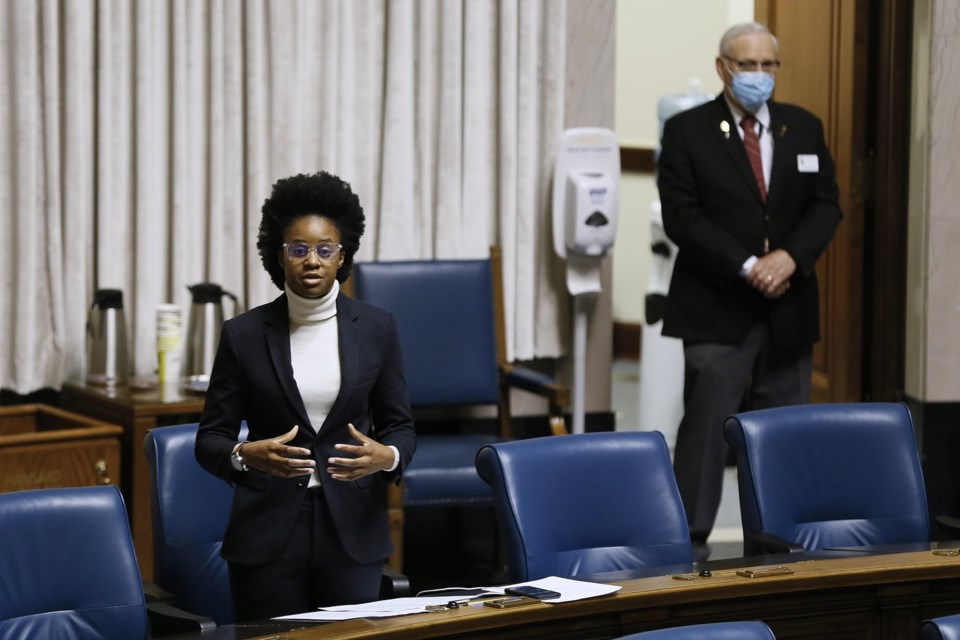WINNIPEG — The Manitoba government promised to control health-care costs Wednesday as it released audits of several health bodies and saw the departure of two chief executive officers.
The Winnipeg Regional Health Authority parted ways with CEO Mike Nader, while Shared Health, the province's central health planning agency, said Lanette Saragusa was out as its CEO.
Minutes later, the NDP government released three audits that said some of the health agencies should be doing more to control spending after years of deficits.
"There are significant challenges in how (service delivery organizations) work with government to ensure both a balanced budget and the achievement of delivering high standards of clinical care across the populations they serve," an audit of some of the agencies, done by consulting firm Deloitte, said.
The Deloitte report said several factors, including higher wages under collective agreements and the rising cost of drugs and medical supplies, have helped squeeze some regional health authorities. The use of nurses provided by private companies was also a factor, especially in the Prairie Mountain authority that covers western Manitoba.
The audit recommends the provincial Health department institute stronger financial accountability. It calls on authorities to move to zero-based budgeting, where projected expenses start from scratch every year or two, based on demonstrated need, instead of using the previous year's spending as a starting point.
Separate audits of Shared Health and the Winnipeg Regional Health Authority, done by consulting firm MNP, also recommend a move to zero-based budgeting. In addition, they recommend swift action whenever a deficit is anticipated in quarterly financial reports.
"The WRHA should be mandated to propose a list of cost-saving measures equal to three times the reported deficit within 90 days when a deficit is reported on the WRHA’s quarterly reporting," the MNP audit said in a recommendation repeated in the Shared Health audit.
All three reports looked at a period between 2019 and last year, and included a surge in expenses during the height of the COVID-19 pandemic.
The NDP government, elected in 2023, blamed the former Progressive Conservative government for rising costs associated with health-care worker overtime and the use of private-agency nurses.
"We recognize that it's far more affordable and fiscally responsible to have folks working in the public system and not relying or over-relying on agency use," Uzoma Asagwara, the province's health minister, said.
Rising health costs have helped raise the Manitoba government's projected overall deficit for the fiscal year that ends next month to $1.3 billion from $796 million. The extra red ink comes at a time when the NDP has promised to balance the budget by 2027 while also hiring more health-care workers and boosting salaries.
The Progressive Conservatives, now in Opposition, said the release of the audits appeared to be mostly a political move aimed at blaming the former government for some upcoming tough decisions.
"I think any unpopular decisions in health care that the NDP make in the next few months will be blamed on these audits," Tory health critic Kathleen Cook said.
The departure of the two CEOs were board decisions, Asagwara said. The NDP had earlier ordered health authorities to redirect eight per cent of administrative costs to the front line.
The audits were generally welcomed by the province's health authorities.
"We welcome release of the findings today, consistent with our own financial reporting which highlights over-expenditures related to the reliance on contracted agency staff and overtime costs as the main contributors to our deficit position," Prairie Mountain Health said in a written statement.
One health workers union warned against a focus on cost-control.
"Our public health-care system needs increased investments to ensure Manitoba can keep and hire more people to provide the care patients and families need," Jason Linklater, president of the Manitoba Association of Health Care Professionals, said.
"If government doesn’t increase funding to match growing service demand and staffing needs, they are just setting up health region leaders for continued failure."
This report by The Canadian Press was first published Feb. 5, 2025
Steve Lambert, The Canadian Press


